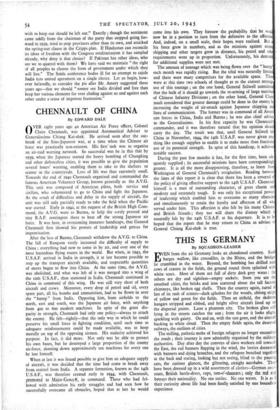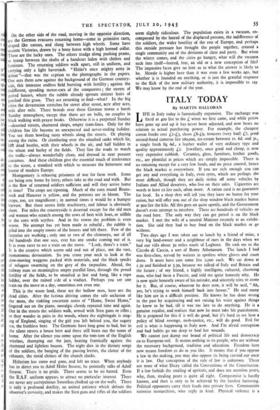THIS IS GERMANY
By SQUADRON-LEADER
EVEN from the air Germany looks an abandoned country. Sunk barges wallow, like crocodiles, in the Rhine, and the bridges lie crumbled in the water. Beyond, the bombing has drilled neat rows of craters in the fields, the ground round them splashed with white scars. Most of them are full of dirty dark grey water: the others are dry and sightless--empty sockets. Soon you see the smashed cities, the bricks and iron scattered about the tall factory chimneys, like broken egg shells. Then the country again, cured at last of its rash of craters—dark splashes for the woods, oblong strips of yellow and green for the fields. Then an airfield, the skeleton hangars stripped and ribbed, and bright silver aircraft lined up on the dispersal points. Later a phantom city. The broken glass still lying in the streets catches the sun ; from the air it looks alight, sparkling with gaiety. On and on, with the sun gone, and the aircraft bucking in white cloud. Then the empty fields again, the deserted railways, the outlines of cities.
The milling, pathetic mobs of foreign refugees no longer encumber the roads ; their journey is now admirably organised by the military authorities. Day after day the convoys of slave workers roll towards the East, the red banners flapping in the wind, the lorries decorated with banners and dying branches, and the refugees bunched together at the back and staring, looking but not seeing, blind to the passind cars, the curious glances, the glittering, straight autobahn. They have been dressed up in a wild assortment of clothes—German over- coats, British battle-dress, caps, tam-o'-shanters ; only the red star betrays their nationality. No one smiles. No one waves. It is as if their curiosity about life had been finally satisfied by one boundless experience. On the other side of the road, moving in the opposite direction, are the German evacuees returning home—some in primitive carts, shaped like canoes, and slung between high wheels. Some have ancient Victorias, drawn by a bony horse with a high horned collar. These are the lucky ones. The others trudge along pushing prams, or tramp between the shafts of a handcart laden with clothes and furniture. The returning soldiers walk apart, still in uniform, and carrying only a light haversack. "Hitler's once mighty army in defeat "—that was the ception to the photographs in the papers. One sees them now against the background of the German country- side, this immense endless field bursting with fertility ; against the indifferent, speeding motor-cars of the conquerors ; the streets of gutted houses, where the rubble already sprouts sinister hairs of parched thin grass. They are returning to find—what? In the big cities the devastation stretches for street after street, acre after acre, mile after mile. There broods over these German towns a harsh Sunday atmosphere, except that there are no bells, no couples in black walking with prayer books. Otherwise it is a perpetual Sunday —deserted streets, shuttered shops, empty tram-lines. Only for the children has life become an unexpected and never-ending holiday. You see them bowling rusty wheels along the streets. Or playing among the ruins. Or clambering over the smashed tanks which lie, lik' dead beetles, with their wheels in the air, and half hidden in the wheat and barley of the fields. They line the roads to watch the traffic—always wonderfully clean, and dressed in neat peasant costumes. And these children give the essential touch of irrelevance to the scene, a standard with which to measure the bitterness and horror of modern Europe.
Montgomery is releasing prisoners of war for farm work. Some are being sent home by lorry, others take to the road and walk. But is the flow of returned soldiers sufficient and will they arrive home in time? The crops are ripening. Much of the corn round Bruns- wick and Hanover is yellow, and the potatoes are in bloom. The crops, too, are magnificent ; in normal times it would be a bumper harvest. But there seems little machinery, and labour is obviously short. For miles the countryside is deserted except for the old men and women who scratch among the rows of beet with hoes, or nib-bole at the corn with scythes. And in the towns the problem is even worse. No attempt has yet been made to rebuild , the rubble is piled into the empty rooms of the houses and left there. Few of the factories are working ; only one or two of the chimneys, out of all the hundreds that one sees, ever has any smoke coming out of it. It is even rarer to see a train on the move. " Look, there's a train." It is the creative which seems odd and out of place, not the vast, monotonous devastation. So you crane your neck to look at the slow-moving waggons packed with materials, and the black specks of refugees swarming on the grey of the tarpaulins. Ahead, the railway runs on meaningless empty parallel lines, through the proud fertility of the fields, to be smashed at last and hang, like a rope ladder, over the ruined side of a viaduct. Perhaps you see one train on the move in a day, sometimes not even one.
This is the waste land, these are the hollow men, here are the dead cities. After the furious driving comes the safe seclusion of the mess, the tinkling uncertain notes of " Home, Sweet Home," fingered out on the piano, nostalgic chords repeated time and again. Out in the streets the soldiers walk, armed with Sten guns or rifles ; or they wander in pairs in the woods, where the nightingale is sing- ing of England, singing of the girl you left behind you, the sugary tea, the frothless beer. The Germans have long gone to bed, but in the silent streets a house here and there still beats out the tunes of home. After the silence you come upon the tom-tom of the English wireless, thumping out the jazz, beating frantically against the shuttered and lightless houses. The night dies in the throaty songs of the soldiers, the banging of the passing lorries, the clatter of the exhausts, the timid chimes of the church clocks.
Hiderism has come and gone, and left no trace. When anybody has to direct you to Adolf Hitler Strasse, he pointedly talks of Adolf Strasse. There is no pride. There seems to be no hatred. Even the R.A.F. uniform appears to attract no particular interest. There are never any surreptitious Swastikas chalked up on the walls. There is only • a profound docility, an animal patience which defeats the observer's-curiosity, and makes the Sten guns and rifles of the soldiers
seem slightly ridiculous. The population exists in a vacuum, en- compassed by the hatred of the displaced persons, the indifference of the soldiers, the wider hostility of the rest of Europe, and perhaps this outside pressure has brought the people together, created a single community out of the divisions of class and party. But when the winter comes, and the cities go hungry, what will the vacuum suck into itself—hatred, fear, an old or a new conception of life? The impassive faces give no hint as to what the answer is likely to be. Morale is higher here than it was even a few weeks ago, but whether it is founded on anything, or is just the grateful response to the flick of the new military authority, it is impossible to say. We may know by the end of the year.



























 Previous page
Previous page